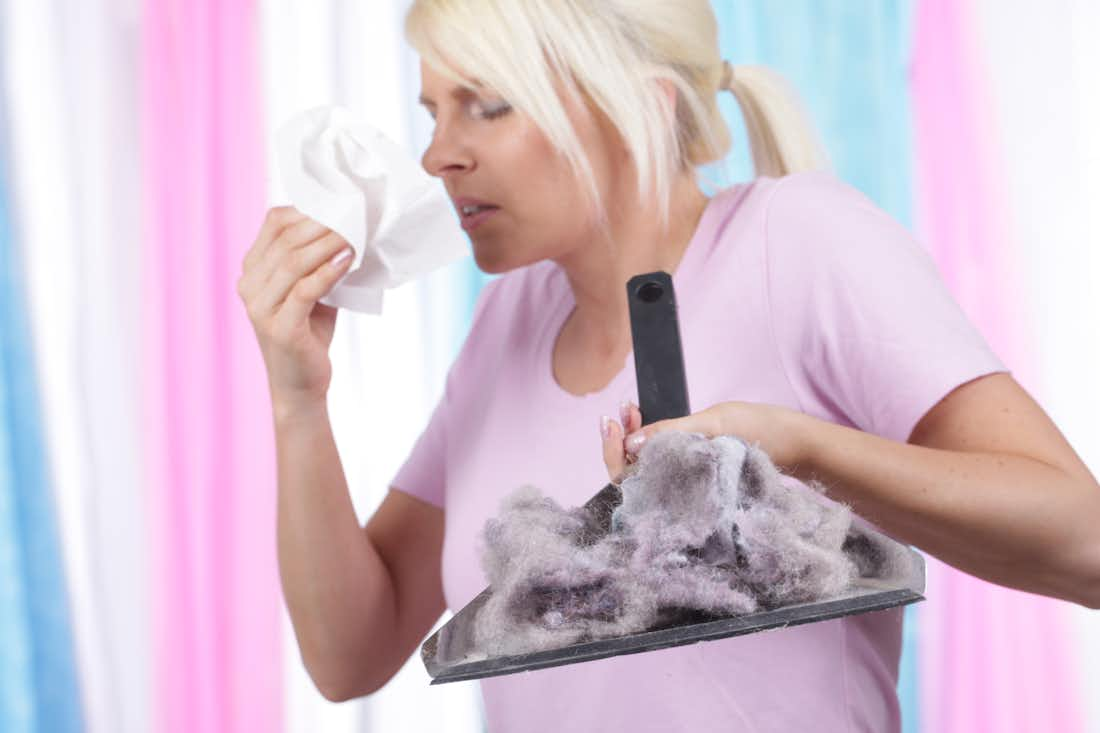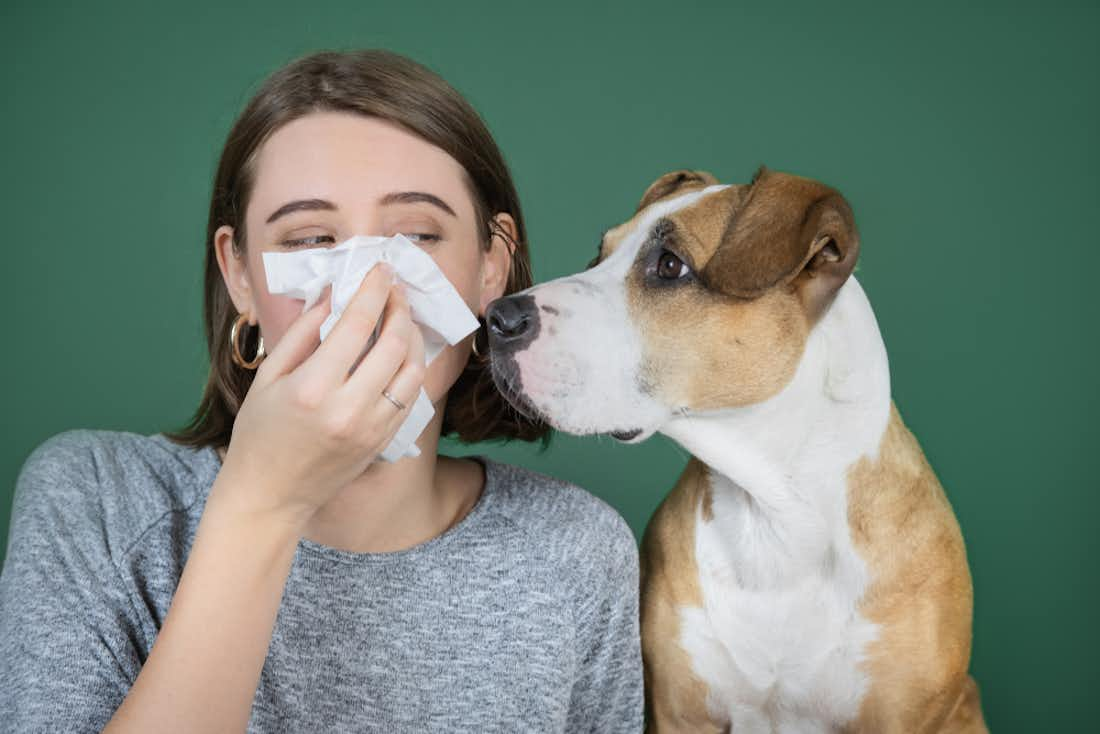May 10, 2022
9 Potential Causes of Itchy Eyes and What You Can Do
5 minute read
Doctors and parents always tell you not to itch your eyes if they start to bother you. And although there are plenty of reasons why they’re right, sometimes the feeling just gets too unbearable.
Itchy eyes can result from a number of causes, but there’s a good chance it’s all due to allergies. Itchy, watery, or red eyes are one of the more common allergy symptoms, but that doesn’t mean you need to let it keep you miserable.
Let’s take a look at some of the underlying causes behind itchy eyes and some tips and tricks for stopping the feeling of eye allergies.
What’s Causing the Itch?
There are a few different reasons you might be dealing with itchy and uncomfortable eyes. Let’s take a look at some of the most common.
1. Allergies
The chances are high that if your eyes are bothering you, it’s because of allergies. Allergies occur when your immune system wrongfully perceives a foreign substance as harmful. The body then releases a chemical called histamine, which causes many allergy symptoms — including itchy, watery eyes.
While almost anything can be an allergy trigger, environmental triggers like pollen, dust mites, or mold tend to be the most likely causes of eye symptoms because of the ease with which they can enter the eye itself. However, some people with food allergies or contact dermatitis can still experience eye symptoms when exposed to an allergen.
It’s possible to have just itchy eyes as an allergy symptom, though it is much more commonly co-occurring with other hay fever symptoms. These include:
- Coughing
- Sneezing
- Difficulty breathing; wheezing
- Runny nose; congestion
- Hives, redness, bumps
The good news is that there are plenty of ways to prevent and treat allergies. If you have outdoor seasonal allergies, be sure to take antihistamine medications before spending too much time outside. These block the effects of histamine, that nagging chemical that leads to itchy eyes in the first place.
You might also be able to treat your allergies from the source by using sublingual immunotherapy, or SLIT, which involves gradually exposing your immune system to an allergen over time. Slowly, your body starts to become tolerant to the substance to a point where it might not affect you anymore.
You can also be sure to cover your eyes with sunglasses to prevent pollen or mold spores from being able to get into the eye in the first place.
If your allergy symptoms worsen indoors, be sure to clean your linens and bedding frequently to kill off any dust mites that may be affecting you. Also, use a dehumidifier in your home to keep the relative humidity between 30 and 50%. This can reduce the risk of mold spores developing and hopefully prevent your eyes from burning or itching.
If you still can’t get the relief you need, you can get some help without needing to leave your home.
Cleared is an online allergy clinic that provides full support and prescription medication through telehealth treatment. Take your free consultation today to get started on the right track towards relief.
2. Conjunctivitis (Pink Eye)
If you’ve ever woken up one morning with your eyes essentially glued shut, you might have had conjunctivitis, better known as pink eye. Conjunctivitis is inflammation of the transparent membrane that lines the eyelid and covers your eyeball. That layer is called the conjunctiva – hence the name!
Pink eye is commonly caused by bacteria or a virus, though reddening of the eye due to allergies is also common. While pink eye makes the eye appear pink or red, it rarely affects your vision.
Symptoms of conjunctivitis include:
- Red or pink hues in the whites of the eye
- Itching or minor burning
- Watery eyes
- Discharge that forms a crust at night, possibly preventing them from opening in the morning
If you suspect you have pink eye, you should see a doctor who can prescribe you the appropriate medication. If bacteria cause it, your doctor will likely prescribe antibacterial eye drops to help you heal sooner. If a virus causes it, they may be able to give you drops to help with itching or redness, but you’ll probably just need to let it run its course.
You’ll want to avoid rubbing your eyes and touching surfaces, as pink eye can be highly contagious. This might cause it to spread from one eye to the other or even spread from person to person.
You can find relief from the itching or burning by using a cold compress or washcloth. Just run a washcloth under cold water and wring it out until it’s damp. Then, place it over both eyes for about 15-20 minutes. This helps to reduce inflammation and ease discomfort.
3. Dry Eye Syndrome
While allergies can make your eyes water and itch, dry eye syndrome makes your eyes super dry – which also causes them to itch. Dry eye syndrome occurs when your body doesn’t make enough tears to keep the eye moist, leading to dryness.
Tears spread across the eye's cornea or front surface every time you blink. Excess tears drain into small ducts in the corner of the eye. Dry eye can occur when either tear production or drainage is out of balance.
It’s especially common in older adults, but anyone can experience dry eye. Cold, windy weather can dry out a person’s eyes, as can wearing contact lenses. You can even dry out your eyes by frequently looking at your phone or computer screens, as you may not blink enough to foster proper lubrication on the eyeball.
Many people with dry eyes use artificial tears or lubricating eye drops to keep their eyes moist.
4. Wearing Contact Lenses
Contact lenses are a discreet way to correct your vision if you have some difficulty seeing, but it might be one of the reasons why your eyes are itching and watering. For one, contacts can dry out your eye and give you some of the symptoms of dry eye syndrome listed above.
Moreover, tiny particles can get caught underneath the contact lens and cause itchiness, pain, or general discomfort. There might even be tiny tears on the lens surface that make them extremely uncomfortable to wear. You might even just have them inside out, leading to irritated eyes.
If you have allergies, your symptoms might worsen if the substance adheres to the lenses. You can usually aid in the sensation by taking out your contacts and cleaning them in contact lens solution before putting them back in.
Additionally, consider wearing backup glasses on days when your allergies are acting up or if you know you’ll be going somewhere in which particles might enter your eyes, such as a hike or the beach.
5. Blepharitis
Blepharitis is inflammation of the eyelids that occurs when the oil glands near the base of the eyelids become clogged. This causes irritation, redness, and often an itching sensation.
Blepharitis is typically caused by an underlying condition, such as seborrheic dermatitis (eyebrow dandruff), allergies, infection, eyelash mites or lice, or rosacea. Many people with blepharitis get a stye, or painful lump, on the edge of the eyelid.
This is a chronic condition that can be difficult to treat, but there are some remedies depending on the type of eye infection you are dealing with. Most treatment methods revolve around the underlying cause, so antibiotics, antivirals, anti-inflammatory drugs, or immune system medications are used to combat its effects.
With that said, blepharitis rarely goes away completely. It often requires daily attention with eyelid scrubs, even if treatment is successful the first time around.
6. Eye Strain
We know how easy it is to stare at TikTok all day long, but this might be why your eyes are uncomfortable. Eye strain is a common eye problem that occurs when you stare at objects for a long period of time, such as a book, magazine, computer, phone, or tablet. This causes you to blink less frequently, which can dry out your eyes and make them feel itchy or uncomfortable.
You can combat eye strain by taking breaks during work and focusing on objects farther away from the device in your hand or on your desk. Additionally, some people find that wearing special blue light glasses can minimize the strain associated with staring at a computer screen.
Other symptoms of eye strain or fatigue include headaches, pain in the neck or shoulders due to stiffness, eye sensitivity, dry eyes, or watery eyes.
7. Meibomian Gland Dysfunction
Meibomian glands are tiny oil glands that line the margin of the eyelids. Their purpose is to coat the eyes' surface to keep the water components of tears from drying out. Together, the water and oil components of the eye help your vision to remain clear and comfortable all day long.
However, people with meibomian gland dysfunction do not secrete enough oil. At first, there are no symptoms associated with this disorder. But over time, it can become chronic, leading to dry eye, itching, burning, styes, intermittent blurry vision, and more.
Since this is another chronic eye condition, you must utilize treatment and home remedies every day. Warm compresses can help to warm the oil in the glands and make them more easily secreted. You can also perform an eyelid massage to loosen up the oil and a lid scrub, which removes debris that might be blocking the gland canal.
8. Uveitis
The uvea is the eye's middle layer between the sclera (white part) and the retina (the light-sensitive layer at the back of the eye). Uveitis is inflammation of the middle uvea layer, often due to the immune system fighting off an infection.
While it directly affects the middle part of the eye, it can also affect other eyeball structures. Uveitis can go away quickly, but it can be long-lasting or even chronic for some people.
Symptoms of uveitis include:
- Itchiness or watery eyes
- Redness
- Eye pain
- Blurry vision
- Light sensitivity
- Floaters (small dark spots that float across your field of view)
If you have uveitis, your eye doctor will likely prescribe anti-inflammatory medications to alleviate inflammation and amp up your comfort. Additionally, they may give you pills or eye drops, depending on the severity of the illness. If all else fails, your doctor might recommend getting eye implants that administer regular steroid doses over time to fight inflammation.
9. Foreign Object Inside the Eye
Last but not least, you might not have a medical ailment. Your itchy eyes might be due to nothing more than a foreign object.
Dust, sand, dirt, eyelashes, pet dander, or even tiny bugs can get caught in your eye and cause loads of discomfort until it is removed. Typically, you can dislodge a foreign object naturally through tearing and watery eyes.
However, you can use artificial tears or eye drops to try to moisten the eye and flush out the object if you can’t seem to get it naturally.
Don’t Rub the Wrong Way
Now that you know some of the common causes of eye itchiness and how to enhance your comfort, let’s talk about one thing you definitely should _not _do if you have itchy eyes: rub or scratch them.
While it might feel ultra-satisfying, rubbing your eyes can do more harm than good. For one, rubbing your eyes frequently can lead to a weakening of the cornea, or keratoconus. This can affect vision and physically change the shape of the eye’s lens, leading to some problems down the road.
Additionally, touching your face can cause infections from bacteria, viruses, or other nasty foreign substances. Especially given the transmission rate of diseases like COVID-19, it’s a good idea to try to keep your hand away from your eyes, nose, and mouth whenever you can.
The occasional eye rub probably won’t be enough to cause any issue, but you shouldn’t form a bad habit, especially if you have a chronic condition in which your eyes are often itchy. Instead, it’s recommended that you use a warm or cool compress over the eyes to bring about relief.
In Conclusion
Itchy eyes can be one of the most frustrating feelings to deal with. And considering there are many reasons it might be happening, it can sometimes feel like there’s no relief in sight.
Some of the most common causes of itchy eyes include allergies, dry eyes, contact lenses, foreign objects in the eye, eye strain, or conjunctivitis. Less common reasons include blepharitis, meibomian gland syndrome, or uveitis.
You can typically find relief from itchy eyes by using a warm or cold compress, taking antihistamine medications, or using over-the-counter eye drops. With that said, one thing you should _not _do is rub your eye, as this can damage the cornea.
If you have an itch that you just can’t scratch, let our online allergists help. Take your free allergy consultation through Cleared to see if allergy season is the reason for your sneezing — or itchy eyes.
Sources:
Pink eye (conjunctivitis) - Symptoms and causes | The Mayo Clinic.
Authors

Dr. Payel Gupta
Medically reviewed by Dr. Payel Gupta



